高中英语状语从句讲解汇总教学提纲
- 格式:doc
- 大小:33.00 KB
- 文档页数:7
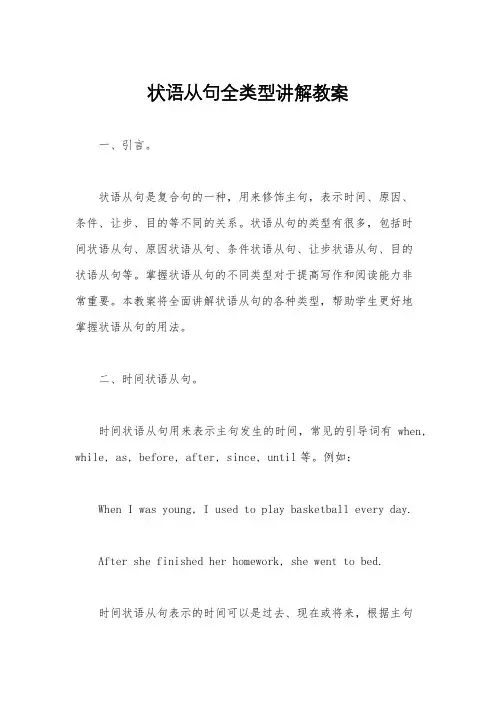
状语从句全类型讲解教案一、引言。
状语从句是复合句的一种,用来修饰主句,表示时间、原因、条件、让步、目的等不同的关系。
状语从句的类型有很多,包括时间状语从句、原因状语从句、条件状语从句、让步状语从句、目的状语从句等。
掌握状语从句的不同类型对于提高写作和阅读能力非常重要。
本教案将全面讲解状语从句的各种类型,帮助学生更好地掌握状语从句的用法。
二、时间状语从句。
时间状语从句用来表示主句发生的时间,常见的引导词有when, while, as, before, after, since, until等。
例如:When I was young, I used to play basketball every day.After she finished her homework, she went to bed.时间状语从句表示的时间可以是过去、现在或将来,根据主句的时态来确定。
需要注意的是,如果主句是一般现在时,时间状语从句通常使用一般过去时表示过去的动作或状态;如果主句是一般过去时,时间状语从句通常使用过去完成时表示更早的过去。
三、原因状语从句。
原因状语从句用来表示主句发生的原因,常见的引导词有because, since, as, for, now that等。
例如:Because it was raining, we stayed at home.Since she was tired, she went to bed early.原因状语从句表示的原因可以是客观原因或主观原因,需要根据具体语境来确定。
需要注意的是,原因状语从句通常放在主句之前,用逗号隔开时则可以放在主句之后。
四、条件状语从句。
条件状语从句用来表示主句发生的条件,常见的引导词有if, unless, provided that, on condition that等。
例如:If it rains tomorrow, we will stay at home.Provided that you finish your homework, you can go outto play.条件状语从句表示的条件可以是真实的、非真实的或虚拟的,需要根据具体语境来确定。

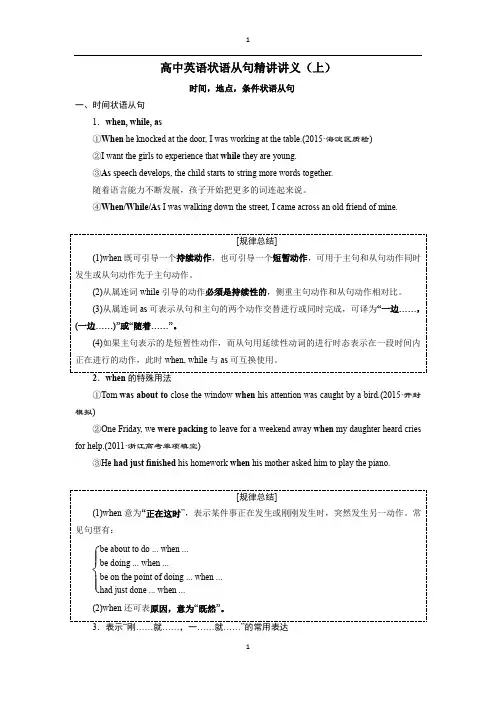
高中英语状语从句精讲讲义(上)时间,地点,条件状语从句一、时间状语从句1.when, while, as①When he knocked at the door, I was working at the table.(2015·海淀区质检)②I want the girls to experience that while they are young.③As speech develops, the child starts to string more words together.随着语言能力不断发展,孩子开始把更多的词连起来说。
④When/While/As I was walking down the street, I came across an old friend of mine.[规律总结](1)when 既可引导一个持续动作,也可引导一个短暂动作,可用于主句和从句动作同时发生或从句动作先于主句动作。
(2)从属连词while 引导的动作必须是持续性的,侧重主句动作和从句动作相对比。
(3)从属连词as 可表示从句和主句的两个动作交替进行或同时完成,可译为“一边……,(一边……)”或“随着……”。
(4)如果主句表示的是短暂性动作,而从句用延续性动词的进行时态表示在一段时间内正在进行的动作,此时when, while 与as 可互换使用。
2.when 的特殊用法①Tom was about to close the window when his attention was caught by a bird.(2015·开封模拟)②One Friday, we were packing to leave for a weekend away when my daughter heard cries for help.(2011·浙江高考单项填空)③He had just finished his homework when his mother asked him to play the piano.[规律总结](1)when 意为“正在这时”,表示某件事正在发生或刚刚发生时,突然发生另一动作。
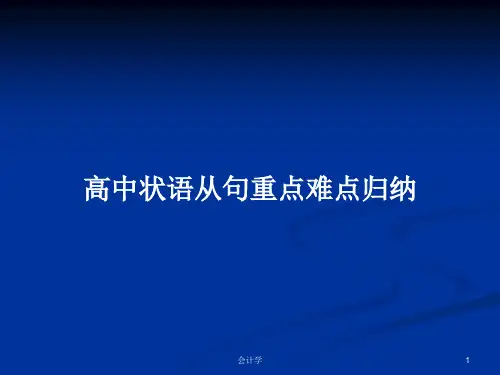
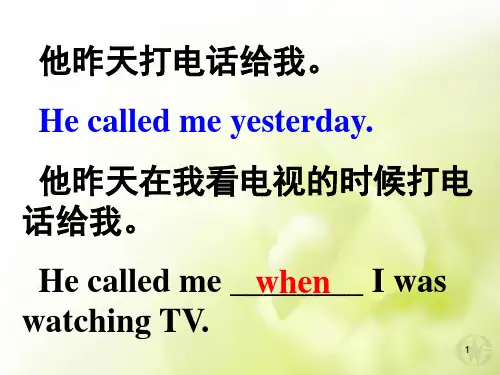
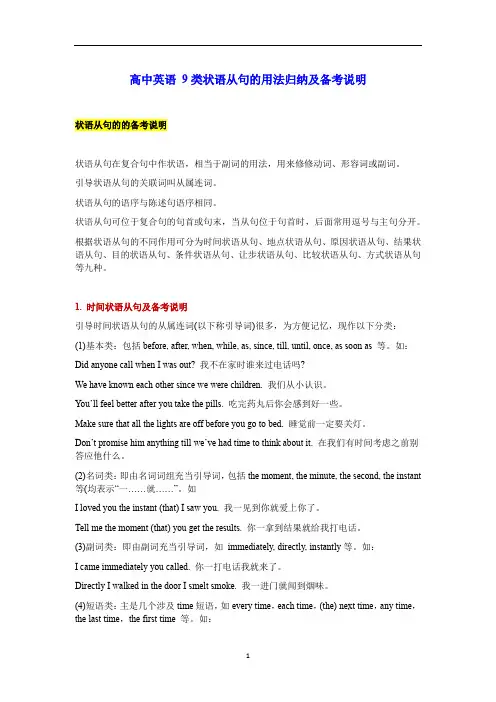
高中英语9类状语从句的用法归纳及备考说明状语从句的的备考说明状语从句在复合句中作状语,相当于副词的用法,用来修修动词、形容词或副词。
引导状语从句的关联词叫从属连词。
状语从句的语序与陈述句语序相同。
状语从句可位于复合句的句首或句末,当从句位于句首时,后面常用逗号与主句分开。
根据状语从句的不同作用可分为时间状语从句、地点状语从句、原因状语从句、结果状语从句、目的状语从句、条件状语从句、让步状语从句、比较状语从句、方式状语从句等九种。
1. 时间状语从句及备考说明引导时间状语从句的从属连词(以下称引导词)很多,为方便记忆,现作以下分类:(1)基本类:包括before, after, when, while, as, since, till, until, once, as soon as 等。
如:Did anyone call when I was out? 我不在家时谁来过电话吗?We have known each other since we were children. 我们从小认识。
You’ll feel better after you take the pills. 吃完药丸后你会感到好一些。
Make sure that all the lights are off before you go to bed. 睡觉前一定要关灯。
Don’t promise him anything till we’ve had time to think about it. 在我们有时间考虑之前别答应他什么。
(2)名词类:即由名词词组充当引导词,包括the moment, the minute, the second, the instant 等(均表示“一……就……”。
如I loved you the instant (that) I saw you. 我一见到你就爱上你了。
Tell me the moment (that) you get the results. 你一拿到结果就给我打电话。
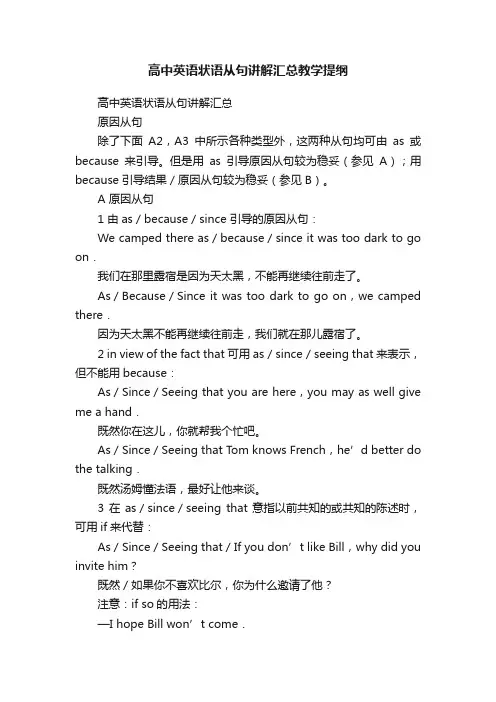
高中英语状语从句讲解汇总教学提纲高中英语状语从句讲解汇总原因从句除了下面A2,A3中所示各种类型外,这两种从句均可由as或because来引导。
但是用as引导原因从句较为稳妥(参见A);用because引导结果/原因从句较为稳妥(参见B)。
A 原因从句1 由as/because/since 引导的原因从句:We camped there as/because/since it was too dark to go on.我们在那里露宿是因为天太黑,不能再继续往前走了。
As/Because/Since it was too dark to go on,we camped there.因为天太黑不能再继续往前走,我们就在那儿露宿了。
2 in view of the fact that可用as/since/seeing that来表示,但不能用because:As/Since/Seeing that you are here,you may as well give me a hand.既然你在这儿,你就帮我个忙吧。
As/Since/Seeing that Tom knows French,he’d better do the talking.既然汤姆懂法语,最好让他来谈。
3 在as/since/seeing that意指以前共知的或共知的陈述时,可用if来代替:As/Since/Seeing that/If you don’t like Bill,why did you invite him?既然/如果你不喜欢比尔,你为什么邀请了他?注意:if so的用法:—I hope Bill won’t come.—If so(=If you hope he won’t come),why did you invite him?—我希望比尔别来。
—如果这样(=如果你希望他不来),你为什么邀请了他?关于if+so/not,参见第347节。
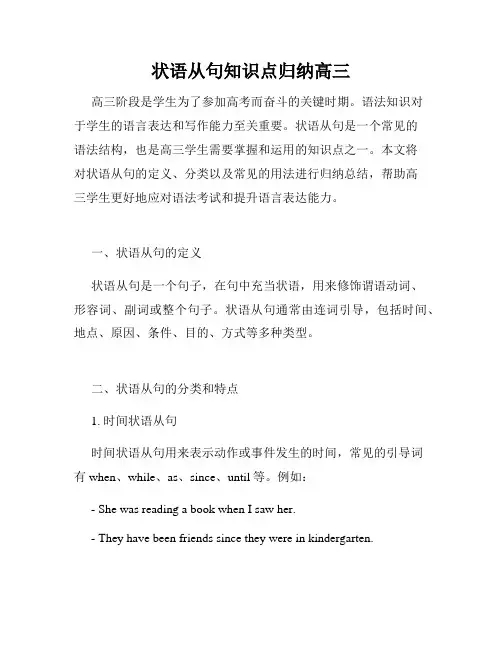
状语从句知识点归纳高三高三阶段是学生为了参加高考而奋斗的关键时期。
语法知识对于学生的语言表达和写作能力至关重要。
状语从句是一个常见的语法结构,也是高三学生需要掌握和运用的知识点之一。
本文将对状语从句的定义、分类以及常见的用法进行归纳总结,帮助高三学生更好地应对语法考试和提升语言表达能力。
一、状语从句的定义状语从句是一个句子,在句中充当状语,用来修饰谓语动词、形容词、副词或整个句子。
状语从句通常由连词引导,包括时间、地点、原因、条件、目的、方式等多种类型。
二、状语从句的分类和特点1. 时间状语从句时间状语从句用来表示动作或事件发生的时间,常见的引导词有when、while、as、since、until等。
例如:- She was reading a book when I saw her.- They have been friends since they were in kindergarten.2. 地点状语从句地点状语从句用来表示动作发生的地点或者某个动作的方向,常见的引导词有where、wherever等。
例如:- He will go wherever his parents go.3. 原因状语从句原因状语从句用来表示某个动作或者事件的原因,常见的引导词有because、since、as等。
例如:- He failed the exam because he didn't study hard.4. 条件状语从句条件状语从句用来表示某个动作的发生或者某件事情的成立条件,常见的引导词有if、unless、as long as等。
例如:- If it rains tomorrow, we will stay at home.5. 目的状语从句目的状语从句用来表示某个动作或者事件的目的,常见的引导词有so that、in order that等。
例如:- We study hard so that we can pass the exam.6. 方式状语从句方式状语从句用来表示某个动作或者事件的方式,常见的引导词有as、as if等。
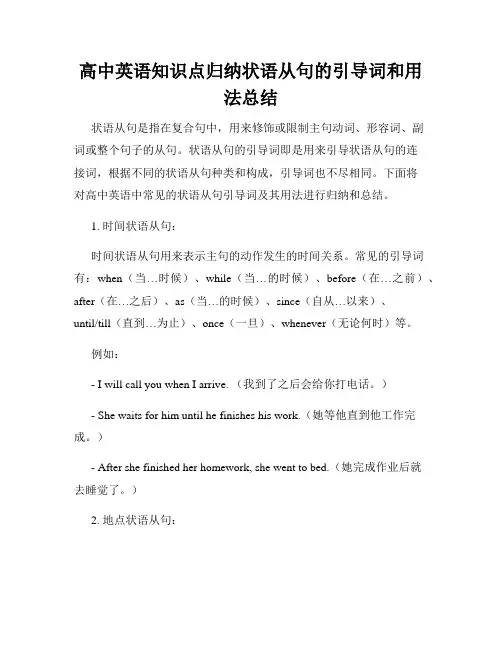
高中英语知识点归纳状语从句的引导词和用法总结状语从句是指在复合句中,用来修饰或限制主句动词、形容词、副词或整个句子的从句。
状语从句的引导词即是用来引导状语从句的连接词,根据不同的状语从句种类和构成,引导词也不尽相同。
下面将对高中英语中常见的状语从句引导词及其用法进行归纳和总结。
1. 时间状语从句:时间状语从句用来表示主句的动作发生的时间关系。
常见的引导词有:when(当…时候)、while(当…的时候)、before(在…之前)、after(在…之后)、as(当…的时候)、since(自从…以来)、until/till(直到…为止)、once(一旦)、whenever(无论何时)等。
例如:- I will call you when I arrive. (我到了之后会给你打电话。
)- She waits for him until he finishes his work.(她等他直到他工作完成。
)- After she finished her homework, she went to bed.(她完成作业后就去睡觉了。
)2. 地点状语从句:地点状语从句用来表示主句的动作发生的地点或位置。
常见的引导词有:where(在哪里)、wherever(无论哪里)、anywhere(任何地方)等。
例如:- I will meet you where we agreed.(我会在我们约定的地方见你。
)- You can go anywhere you want.(你可以去任何你想去的地方。
)3. 原因状语从句:原因状语从句用来表示主句的动作发生的原因或理由。
常见的引导词有:because(因为)、since(因为)、as(因为)、now that(既然)、due to(由于)等。
例如:- She didn't come to the party because she was sick.(她因为生病没来参加聚会。
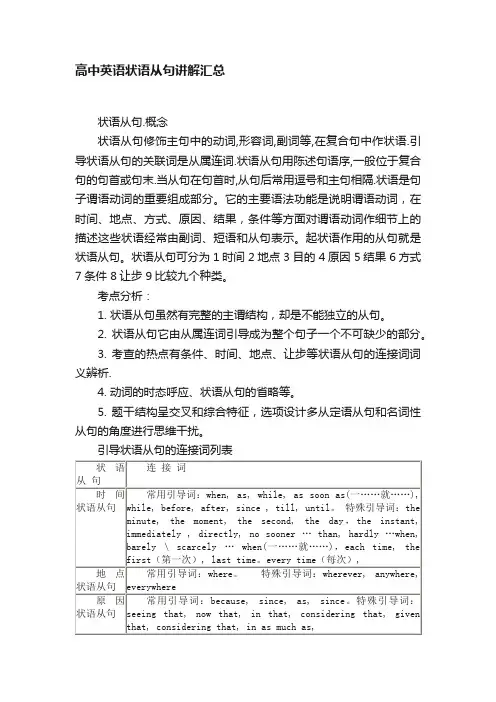
高中英语状语从句讲解汇总状语从句.概念状语从句修饰主句中的动词,形容词,副词等,在复合句中作状语.引导状语从句的关联词是从属连词.状语从句用陈述句语序,一般位于复合句的句首或句末.当从句在句首时,从句后常用逗号和主句相隔.状语是句子谓语动词的重要组成部分。
它的主要语法功能是说明谓语动词,在时间、地点、方式、原因、结果,条件等方面对谓语动词作细节上的描述这些状语经常由副词、短语和从句表示。
起状语作用的从句就是状语从句。
状语从句可分为1时间 2地点 3目的 4原因 5结果 6方式7条件 8让步 9比较九个种类。
考点分析:1. 状语从句虽然有完整的主谓结构,却是不能独立的从句。
2. 状语从句它由从属连词引导成为整个句子一个不可缺少的部分。
3. 考查的热点有条件、时间、地点、让步等状语从句的连接词词义辨析.4. 动词的时态呼应、状语从句的省略等。
5. 题干结构呈交叉和综合特征,选项设计多从定语从句和名词性从句的角度进行思维干扰。
引导状语从句的连接词列表★★★★第一讲:时间状语从句★★★★1. 表示“一…就…”的连接词引导的时间状语从句:1由“as soon as, th e instant/ the moment, the minute, instantly, directly, once, immediately”等引导的时间状语从句:The moment he saw me, he ran away. 他一看见我,就跑了。
My sister came directly she got my message. 我妹妹一收到我的信息就来了。
Once printed, this book will be very popular.一印刷,这本书就将非常流行。
Instantly the button is pressed, the mine explodes.这个扭一按下去,这矿就爆炸了。
They told me the news immediately they got the message.他一得到信息就马上把消息告诉了我。
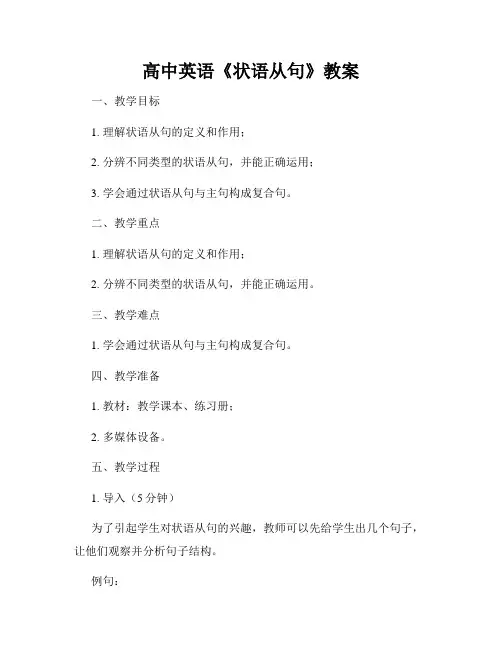
高中英语《状语从句》教案一、教学目标1. 理解状语从句的定义和作用;2. 分辨不同类型的状语从句,并能正确运用;3. 学会通过状语从句与主句构成复合句。
二、教学重点1. 理解状语从句的定义和作用;2. 分辨不同类型的状语从句,并能正确运用。
三、教学难点1. 学会通过状语从句与主句构成复合句。
四、教学准备1. 教材:教学课本、练习册;2. 多媒体设备。
五、教学过程1. 导入(5分钟)为了引起学生对状语从句的兴趣,教师可以先给学生出几个句子,让他们观察并分析句子结构。
例句:a) While I was studying, my phone rang.b) If it rains tomorrow, we won't go to the park.引导学生思考这些句子中的从句是什么作用,并引导他们尝试理解状语从句的概念。
2. 知识讲解(15分钟)解释状语从句的定义和作用,强调状语从句与主句的关系,并通过几个例句进一步说明。
教师可以按照以下顺序讲解不同类型的状语从句:a) 时间状语从句b) 条件状语从句c) 原因状语从句d) 结果状语从句e) 目的状语从句解释每个类型的状语从句时,可以给出相应的例句,并解释例句中状语从句的用法和意义。
3. 练习与巩固(25分钟)通过练习题帮助学生巩固所学的知识。
例题:1. _______ I was reading a book, the phone rang.a) Ifb) Whilec) Becaused) So2. We won't go to the park _______ it rains.a) whenb) ifc) becaused) so让学生独立完成练习题,并检查答案,解释正确答案的原因。
4. 拓展与应用(15分钟)通过提供更复杂的句子和情境,让学生在实际应用中运用状语从句。
例句:a) If I have time, I will visit my grandparents this weekend.b) Unless you apologize, I won't forgive you.教师可以组织学生分组讨论、编写对话或者写作,要求他们使用状语从句构成复杂句。
高考英语语法复习状语从句知识讲解一、概述常见的有although/though/even though引导的让步状语从句。
if/unless引导的条件状语从句。
until/when/while/as soon as引导的时间状语从句。
because引导的原因状语从句,so that引导的目的状语从句等。
if引导的条件状语从句和when引导的时间状语从句一般都会和时态相结合,即主要考查“主将从现”原则。
对于状语从句的学习可与专题六从属连词相结合。
在时间状语从句和条件状语从句中,主句和从句的时态一致问题一般有两种情况:(1)“主将从现”:主句用一般将来时,而从句用一般现在时。
常见的使用“主将从现”原则的连词有:表示时间的when, while, after, before, until, till, whenever, as soon as, as long as, once 等;表示条件的if, unless, so long as, in case等。
(2)“主祈从现”:若主句是祈使句,或主句中有情态动词时,那么从句用一般现在时表示将来。
(3)“主情从现”:若主句有情态动词, 那么从句用一般现在时表示将来。
如:You can get good grades if you study hard.如果你努力学习,你将取得好成绩。
状语从句由从属连词引导,与主句连接,位于句首时,常用逗号与主句分开,位于句末时,其前一般不用逗号。
状语从句根据其用途可分为时间状语从句、条件状语从句、原因状语从句、目的状语从句、结果状语从句、让步状语从句、比较状语从句、地点状语从句等。
二、时间状语从句(1)当主句是一般将来时态或祈使句,表示将来的意义时,从句通常用一般现在时,简称“主将从现”。
I’ll ring you up as soon as I get to Beijing.我一到北京就给你打电话。
(2) when引导的时间状语从句,通常表示主句和从句的动作同时发生;before表示主句的动作发生在从句的动作之前;after则表示主句的动作发生在从句的动作之后;as引导时间状语从句时,往往表示主句和从句的动作同时发生,不分先后。
高三英语语法专题复习之状语从句教材内容分析本课是进行高三英语语法的复习,我在教学中将语法知识的传授和语言基本技能的学习结合到一起,注重复习语法与语言的运用。
采用任务型教学法和小组合作探究学习法,从而扩大课堂的语言输入量及学生的语言输出量。
教学目标1、知识与技能引导学生准确把握非状语从句的使用。
根据该语法规律解决实际问题。
在运用语言的过程中培养学生的观察力、分析力、想象力和自学能力,帮助学生加强记忆力,提高思维能力和运用英语的综合能力,激发创造能力。
2、过程与方法以学生为主体,尝试创新思维,联系社会采用讨论、协作、探究、竞争的教学模式,引导学生灵活运用所学语法知识3、情感、态度的价值观。
用状语从句的句子结构表达思想感情和正确的世界观、人生观。
形成健全的情感态度,为未来发展和终身学习奠定好的基础。
教学重难点1)教学重点:了解和掌握状语从句的使用。
2)教学难点:能够运用此语法规则完成各种练习训练,并在实际语言活动中灵活运用。
一.状语从句的定义:在复合句中由从句表示的状语称作状语从句,它可以用来修饰谓语(包括非谓语动词)、定语或状语,或是整个句子。
状语从句通常由一个连词引起,也可以由一个起连词作用的词组引起,有时甚至不需要连词直接和主句连接起来。
状语从句一般分为九大类时间状语从句地点状语从句原因状语从句目的状语从句结果状语从句条件状语从句方式状语从句比较状语从句让步状语从句二.状语从句的分类:1.时间状语从句:在时间状语从句中,要注意时态一致,一般情况下主句是将来时的时候,从句要用一般现在时。
可以引导时间状语从句的连词很多,根据意义和主从句之间的时间关系,又可分类如下:(1)表示同时性,即主从句的谓语动作同时发生或几乎同时发生。
其连词有:when (当……的时候), while(当……的时候), as(当……的时候), once(一旦……)as soon as(一……就……), the time(当……的时刻), the moment(当……的时刻), by the time(到……时候为止), next time(下次), the first time(第一次……的时候), the last time(上次……的时候),immediately(一……就……), instantly(一……就……),directly(一……就……)以下关联词引起的句子中,前面常用过去完成时,后面用一般过去时hardly /scarcely…when…(刚……就……), no sooner…than…(刚……就……)Strike while the iron is hot.趁热打铁。
状语从句教案教案标题:状语从句教案一、教学目标:1. 知识目标:学生能够理解和区分状语从句及其分类,并掌握它们在句子中的正确用法。
2. 能力目标:学生能够正确运用状语从句来丰富和改变句子的意思。
3. 情感目标:通过学习状语从句,培养学生对语法知识的兴趣,提高他们的语言表达能力。
二、教学重点:1. 理解和分辨状语从句及其分类。
2. 掌握状语从句的常见引导词和句型。
3. 运用状语从句来改变句子结构和运用范围。
三、教学难点:1. 区分状语从句的不同类型。
2. 理解状语从句与主句的逻辑关系。
四、教学方法:1. 提问法:通过提问,引导学生思考状语从句的不同种类及其用法。
2. 归纳法:通过让学生总结规律,形成对状语从句的整体概念。
3. 练习法:通过一些练习题帮助学生巩固状语从句的使用。
五、教学过程:1. 导入:通过提问复习学生对从属连词的理解,例如:“when”和“where”这样的词在句子中有什么作用?2. 呈现:向学生介绍状语从句的定义和作用,以及主要的引导词,如:"when","where","if"等。
3. 教学:详细讲解不同类型的状语从句,并分别给出例句和解释,如时间状语从句、地点状语从句、条件状语从句等。
4. 练习:让学生根据给定的句子,判断下划线部分是哪种类型的状语从句,并改写句子,如:"I will call you when I arrive home." → "When I arrive home, I will call you."5. 巩固:让学生在小组中进行练习,编写句子包含状语从句,并与同伴分享。
6. 拓展:给学生一些拓展练习,包括使用不同类型的状语从句来改写句子或填空练习。
7. 总结:让学生总结本堂课所学内容,包括状语从句的定义、特点、分类和使用方法。
8. 作业:布置相关的练习题,巩固学生对状语从句的理解和运用。
高中英语状语从句用法详细解析一、定义:在句中作状语的从句是状语从句,修饰主句中的动词、形容词或副词等。
状语从句由从属连词引导,从属连词在句中不充当句子成分,只起连接作用,状语从句放在句首时,要用逗号,放在句尾时不用。
二、分类根据意义上的不同,状语从句可分为:①时间状语从句②地点状语从句③原因状语从句④目的状语从句⑤条件状语从句⑥结果状语从句⑦让步状语从句⑧方式状语从句⑨比较状语从句三、时间状语从句(一)引导时间状语从句的连词有:as, when(whenever), before, after, as soon as, until(till), since, every time, once.(二)、“as” as, when, while都有“当……的时候”,可以互用When she was a child.While she was a child. She Lived in Paris.As she was a child.as有“一边…一边”的意思He sang as he walked.“when”When the clock struck twelve, all the lights went out.I was sleeping when she came in. 动补When we arrived at the station, the train had left.“while” 主、从句动作或状态同时发生。
用while引导的从句用延续性动词,常表示较长的时间或一个过程。
While we were having supper, all the lights went out.Please keep quiet while others are studying.While I was writing letters last night, he was watching TV.when, while并列连问。
高中英语状语从句讲解汇总原因从句除了下面A2,A3中所示各种类型外,这两种从句均可由as或because来引导。
但是用as引导原因从句较为稳妥(参见A);用because引导结果/原因从句较为稳妥(参见B)。
A 原因从句1 由as/because/since 引导的原因从句:We camped there as/because/since it was too dark to go on.我们在那里露宿是因为天太黑,不能再继续往前走了。
As/Because/Since it was too dark to go on,we camped there.因为天太黑不能再继续往前走,我们就在那儿露宿了。
2 in view of the fact that可用as/since/seeing that来表示,但不能用because:As/Since/Seeing that you are here,you may as well give me a hand.既然你在这儿,你就帮我个忙吧。
As/Since/Seeing that Tom knows French,he’d better do the talking.既然汤姆懂法语,最好让他来谈。
3 在as/since/seeing that意指以前共知的或共知的陈述时,可用if来代替:As/Since/Seeing that/If you don’t like Bill,why did you invite him?既然/如果你不喜欢比尔,你为什么邀请了他?注意:if so的用法:—I hope Bill won’t come.—If so(=If you hope he won’t come),why did you invite him?—我希望比尔别来。
—如果这样(=如果你希望他不来),你为什么邀请了他?关于if+so/not,参见第347节。
B 结果从句由because或as引导:The fuse blew because we had overloaded the circuit.保险丝烧断了,因为我们使线路超载了。
He was angry because we were late.他生气是因为我们来晚了。
As it froze hard that night there was ice everywhere next day.因为那天晚上冷得厉害,所以第二天到处都是冰。
As the soup was very salty we were thirsty afterwards.因为这汤很咸,后来我们渴得厉害。
C 这种组合也可用so连接两个主句的形式来表示:It was too dark to go on,so we camped there.天太黑了,不能继续往前走了,所以我们就在那儿露宿了。
You are here,so you may as well give me a hand.你们既然在这儿,不如就帮我一下。
It froze hard that night,so there was ice everywhere next day.那天夜里冷得厉害,所以第二天到处都是冰。
也可以使用therefore,但只限用于非常正式的句子中:The Finnish delegate has not yet arrived.We are therefore postponing/We have therefore decided to postpone/Therefore we are postponing the meeting.芬兰代表还没有到达。
我们因此要把会议推迟/因此我们已决定把会议推迟/因此我们要把会议推迟。
(注意therefore可以放在几个不同的位置。
)such/so…that引导的结果从句A such是形容词,用于形容词+名词结构之前:They had such a fierce dog that no one dared to go near their house.他们有一条如此凶猛的狗,以致没人敢靠近他们家。
He spoke for such a long time that people began to fall asleep.他说了这么长时间,以致在座的人都犯困了。
B so是副词,用于副词和不带名词的形容词之前:The snow fell so fast that our footsteps were soon covered up.雪下得这么快,以致我们的脚印很快就被雪盖住了。
His speech went on for so long that people began to fall asleep.他的讲话这么长,以致在座的人都开始犯困了。
Their dog was so fierce that no one dared come near it.他们的狗太凶猛了,所以没人敢靠近它。
但such不能用于much和many之前,所以so可用于后跟名词的much和many之前:There was so much dust that we couldn’t see what was happening.灰尘太大了,使得我们看不清发生了什么事。
So many people complained that they took the programme off.抱怨的人太多,所以他们取消了那个节目。
C 注意:such+a+形容词+名词可由so+形容词+a+名词来代替,所以such a good man可由so good a man来代替。
这只能在名词前面有a/an的情况下使用。
这种形式不常见,但有时出现在文学作品中。
有时为了表示强调,so位于句首。
这时后面跟动词的倒装形式:So terrible was the storm that whole roofs were ripped off.暴风真可怕,把整个的屋顶全都刮飞了。
让步从句它们由下列词来引导:although,though,even though,even if,no matter,however(参见第85节)。
有时也可以使用whatever。
as也可以,但是只限于形容词+as+be结构。
Although/Though/Even though/Even if you don’t like him you can still be polite.尽管/即使/纵然/即使你不喜欢他,你仍可有礼貌一些。
No matter what you do,don’t touch this switch.无论怎样,都别碰这个按钮。
However rich people are,they always seem anxious to make more money.无论人们多么富有,他们似乎总还渴望赚到更多的钱。
However carefully you drive,you will probably have an accident eventual-ly.无论你开车多小心,最后你大概还会出车祸。
Whatever you do,don’t tell him that I told you this.无论如何,别跟他说这件事是我告诉你的。
Patient as he was,he had no intention of waiting for three hours.哪怕他再有耐心,也不打算等上三个小时。
may+动词原形可用于假设情况:However frightened you may be yourself,you must remain outwardly calm.无论你有多害怕,外表上你仍要保持冷静。
may含有I accept the fact that(我接受这一事实)的意思:—But he’s your brother!—He may be my brother but I don’t trust him!—可他是你的兄弟!—尽管他是我的兄弟,可我不信任他!但may这样用时,是另一主句的一部分,并不属于让步从句之列。
should+动词原形结构可用于even if之后,正如用于条件句的if之后一样,用来表示should后面的动词原形所指的动作不太可能发生:Even if he should find out he won’t do anything about it.即便他发现了,他也不会采取什么行动的。
比较从句A 形容词和限定动词连用时的比较It’s darker today than it was yesterday.今天比昨天天色昏暗。
He doesn’t pay as much tax as we do/as us.他没我们交的税款多。
He spends more than he earns.他花的比挣的多。
注意:that+形容词是一种口语形式,表示“那么……”:—Will it cost£100?—No,it won’t cost as much as(all)that.It won’t be(all)that expensive./It won’t be as expensive as that.—要花100英镑吗?—不,花不了那么多。
没那么贵。
that+形容词结构有时用于口语中表示very(很)的意思。
B 副词和限定动词连用时的比较He didn’t play as well as we expected/as well as you(did).他打得不如我们预料的好/你打得好。
He sings more loudly than anyone I’ve ever heard/than anyone else (does).他唱得比我听到的任何人唱得都响/比任何人都声音响。
You work harder than he does/than him/than I did at your age.你比他干得卖劲/我在你这个年龄时干得卖劲。
C 形容词和不定式或动名词连用时的比较:通常两者都可使用,但动词不定式常常用于特定的动作,动名词则用于一般情况(参见下面E):It’s sometimes as cheap to buy a new one as(it is)(to)repair the old one.Buying a new one is sometimes as cheap as repairing the old one.有时买一个新的跟修理旧的一样便宜。
He found that lying on the beach was just as boring as sitting in his office.He found lying on the beach just as boring as sitting etc.他发现躺在沙滩上和坐在办公室里一样没趣/烦人。